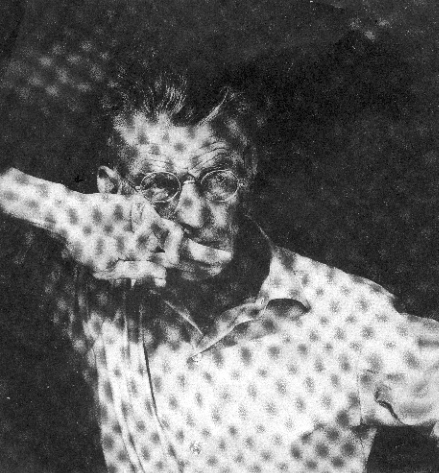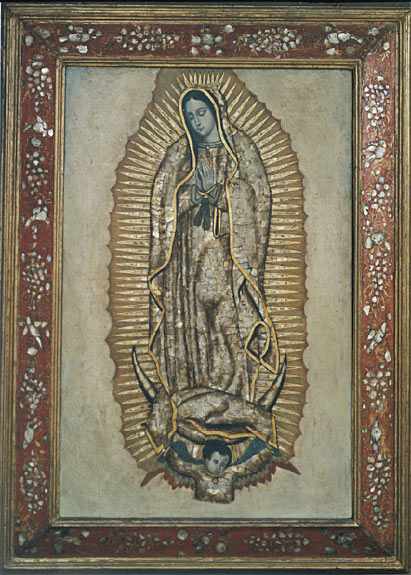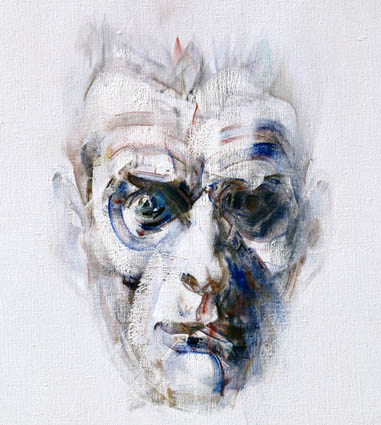
Somewhere on a continuum between Tolstoy's
The Death of Ivan Ilych and Tom McCarthy's
Remainder lies Samuel Beckett's short novel,
Malone Dies. Let me explain.
In the Tolstoy, for the first time, we saw the novelist attempting to portray the consciousness of a dying character from the inside, i.e., the dying man's point of view. He faced the same problem as those fundamentalists who claim Moses wrote the first five books of the Bible, to wit: how could Moses in the thirty-fouth chapter of Deuteronomy have written about his own burial? (NB: These, of course, are the moderate fundamentalists. For the truly die hard, the entire Bible was dictated word-by-word by their god. In fact, when I worked in the library at an evangelical seminary where they used to shelve the books by author, the joke was that we needed to shelve the Bible under 'S' for 'Spirit, Holy'.) Ilych dies in the last sentence on the last page of the last chapter. The artifice is evident, especially given the first chapter which is written in a more omniscient, third-person POV-type free indirect style.
At the end of McCarthy's book, we found the unnamed protagonist circling (figure-eighting, to be precise) in a hijacked private jet waiting, presumably, for it to run out of fuel and plummet from the sky. This would have re-enacted the incident which changed his life, but from the point of view of the inciting object. In the meantime, he had spent his considerable fortune re-creating and re-enacting scenes from his life. At first the scenes he sought to reproduce had happened directly to him and he tried to re-create his direct sensory sensations—the sight and feel of a crack in the wall, the smell of liver cooking, a pianist rehearsing, the sight of black cats on red roofs, etc. As the story progressed the scenes grew farther and farther away from his direct experience until, at the end, he pre-enacts a scene he wants to see happen in the future. The distance of alienation increases with each re-enactment, but the themes of unexpected windfall and unknown object falling from the sky somehow persist.
Where, then, does the Beckett lie? In
Malone Dies, Beckett's protagonist, like Ivan Ilich, is dying. The first line of the book reads: "I shall soon be quite dead at last in spite of it all." Malone sounds almost relieved, his life has been miserable. Unlike Tolstoy, Beckett does not give us the straight inner consciousness of the protagonist. "I shall not watch myself die," Malone baldly states on the first page. Instead, he defers it. Malone tries, in a sense, to escape death by trying to think about something else, or, in the language of criticism, alienating his consciousness of what is happening to him. How does he accomplish this? By writing!
Is this, then, meta-fiction? Is this an allegory of the artist's struggle? Good questions, best left to be resolved by evidence in the text. "While waiting I shall tell myself stories, if I can. ... I have also decided to remind myself briefly of my present state before embarking on my stories. I think this is a mistake. It is a weakness. But I shall indulge in it." He proposes to divide the time he has remaining (as best as he can predict it) into five projects: "Present state, three stories, inventory, there. An occasional interlude is to be feared. A full programme, I shall not deviate from it any further than I must. So much for that. I feel I am making a great mistake. No matter."
Here Beckett gives us his thesis statement in the guise of Malone laying out the project for the rest of his life. Each, we discover, is problematic: Malone's present state is unknowable: he is confined to bed and cannot explore the room he finds himself in much less the world he can spy beyond the frame of his window. His stories keep getting interrupted by his own sufferings and intrusions. The inventory, likewise, is problematic for Malone is unsure what he has—as opposed to what he once had and lost or what he thinks he has—and keeps losing things he imagines he has. The whole program is, we infer, uncertain at best, and, more likely, doomed to failure. Indeed, "a great mistake." Yet it is all that Malone is capable of doing.
Malone is, ostensibly, an old man living out his final days of bedridden isolation in a small room in some sort of care-giving institution—a hospital, an asylum, a prison, it is never entirely clear to him or to us.
"A few words about myself perhaps. My body is what is called, unadvisedly perhaps, impotent. There is nothing it can do. Sometimes I miss not being able to crawl around any more. But I am not much given to nostalgia. My arms, once they are in position, can exert a certain force. But I find it hard to guide them. Perhaps the red nucleus has faded. I tremble a little, but only a little. The groaning of the bedstead is part of my life, I would not like it to cease, I mean I would not like it to decrease. It is on my back, that is to say prostrate, no, supine, that I feel best, least bony. I lie on my back, my cheek is on the pillow. I have only to open my eyes to have them begin again, the sky and smoke of mankind. My sight and hearing are very bad, on the vast main no light but reflected gleams. All my senses are trained full on me, me. Dark and silent and stale, I am no prey for them. I am far from the sounds of blood and breath, immured. I shall not speak of my sufferings. Cowering deep down among them I feel nothing. It is there I die, unbeknown to my stupid flesh. That which is seen, that which cries and writhes, my witless remains. Somewhere in this turmoil thought struggles on, it too wide of the mark. It too seeks me, as it always has, where I am not to be found. It too cannot be quiet. On others let it wreak its dying rage, and leave me in peace. Such would seem to be my present state."
Malone here is the direct descendant of Ilych—
sans, say, any sentimental nostalgia or, its obverse, regret or, importantly, insight. In fact, Malone claims he will not indulge any complaining about his symptoms or sufferings (
contra Ilich). He proposes to hide from any revelation about his condition, whereas Ilich was radically open to his ethical epiphanic experience. Profoundly, Malone asserts he himself, his authentic self, his essence, is something more than the sum of his sufferings, something untouchable. Something unnamable perhaps?
How does Malone propose to evade his present state? He tells stories. The first is about a young man named Saposcat a/k/a Sapo. Sapo eventually morphs, in the second story, into Macmann: "For Sapo—no, I can't call him that any more, and I even wonder how I was able to stomach such a name till now. So then for, let me see, for Macmann, that's not much better but there is no time to lose, for Macmann might be stark staring naked under this surtout for all anyone would be any the wiser." And Macmann embodies all "the Murphys, Merciers, Molloys, Morans and Malones" we have come to know from Beckett's fiction.
The stories are problematic for the characters keep morphing with Malone. It is, nevertheless, safe to say the stories Malone attempts to tell to avoid thinking about his own dying are, in fact, self-reflexive. They are stories about himself—deferred one degree. There is some experiential truth in them.
I simply believe I can say nothing that is not true, I mean that has not happened, it's not the same thing but no matter. Yes, that's what I like about me, at least one of the things, that I can say, Up the Republic!, for example, or, Sweetheart!, for example, without having to wonder if I should not rather have cut my tongue out, or said something else. Yes, no reflection is needed, before or after, I have only to open my mouth for it to testify to the old story, my old story, and to the long silence that has silenced me, so that all is silent. And if I ever stop talking it will be because there is nothing more to be said, even though all has not been said, even though nothing has been said. But let us leave these morbid matters and get on with that of my demise, in two or three days if I remember rightly. Then it will be all over with the Murphys, Merciers, Molloys, Morans and Malones, unless it goes on beyond the grave. But sufficient unto the day, let us first defunge, then we'll see. How many have I killed, hitting them on the head or setting fire to them? Off-hand I can only think of four, all unknowns, I never knew anyone. A sudden wish, I have a sudden wish to see, as sometimes in the old days, something, anything, no matter what, something I could no have imagined. There was the old butler too, in London I think, there's London again, I cut his throat with his razor, that makes five.(236)
This dark passage reveals so much. Whatever it is that exists beyond the suffering of the human body (for convenience's sake, let's call it a soul), Beckett seems to be saying, we cannot know in this life whether it exists beyond the grave. We must defunge first! In Italian,
defungere means "to die". Thus, before we can know if the soul lives on beyond the grave, we must die.
Fungere, though, means to act as or in place of another. Maybe, then, immortality lies in the creation of fictions, of art. No matter. The truth is there, somewhere. It is also interesting to note that, like Lemuel, Malone is a multiple murderer; their stories, too, coalesce in Malone's dying. Again, there is no escape from the experiential truth of the self, despite one's fictions.
In this, the remainder of the book becomes the precursor of the McCarthy, whose protagonist attempts to re-enact a significant experience of his life to recapture a feeling of
deja vu he experienced. Subsequently, he tries to re-enact a moment in a complete stranger's life to capture the feelings that person felt when he experienced his own murder. There is an "other minds" argument going on in
Remainder that is absent in the Beckett. Finally, McCarthy's hero attempts to create an experience he has never known—thus, definitively, taking it beyond the Beckett.
The irony is that no matter how hard Malone tries to escape his situation by frantically scribbling stories and inventories, he keeps returning to himself. The same holds in the McCarthy: the protagonist wants to recapture the one true 'authentic' moment he had begging for money in front of his stock broker's offices after he had won a settlement for the accident. He figures a bank heist might do the trick in an exaggerated sort of way. Indeed, he receives a sack of money but things go wrong and he winds up about to fall from the sky just like the mysterious object that clocked him, knocked him into a coma, and nearly killed him. The message is the same in both the Beckett and the McCarthy: no matter how much one attempts to defer one's self, no matter how much one resists, no matter how much one projects, no matter how much one scribbles one's fictions (or, in the Beckett, describes one's realities), one cannot really escape one's self. It is "immured", one might say imprisoned, in our "stupid flesh." The eternal return (to borrow Nietzsche's formulation) of the true self—whether in story or in the act of creation—is inescapable: the ineluctable modality (to borrow Joyce's) of the self. [More to follow]

 Those clickers didn't stay for long.
Those clickers didn't stay for long. As for comments: I wish there'd've been more comments from my readers. I welcome them. The ones I've gotten, I've enjoyed the 'ahem' attention and tried to respond thoughtfully and appropriately. To generate more comments, should I try to be more provocative, more controversial? I wonder, too, if I should do less essayistic posts, less intertextual (self-referential) posts, less theme-blog posts, more aggregating posts.
As for comments: I wish there'd've been more comments from my readers. I welcome them. The ones I've gotten, I've enjoyed the 'ahem' attention and tried to respond thoughtfully and appropriately. To generate more comments, should I try to be more provocative, more controversial? I wonder, too, if I should do less essayistic posts, less intertextual (self-referential) posts, less theme-blog posts, more aggregating posts.


















